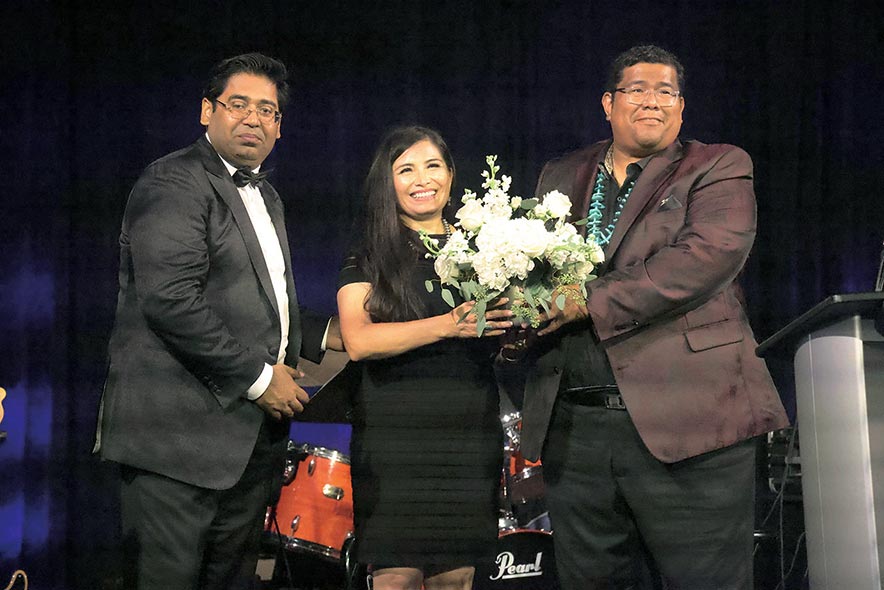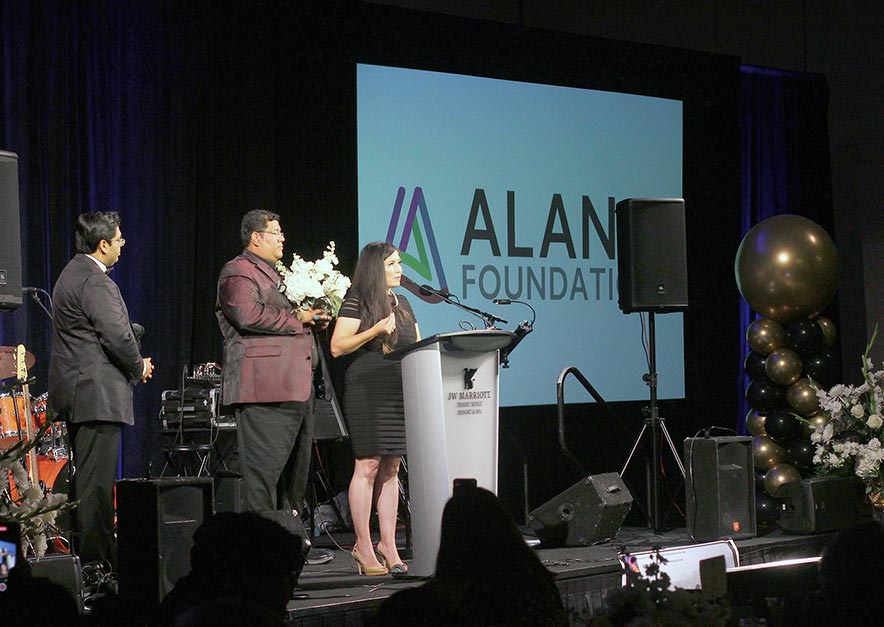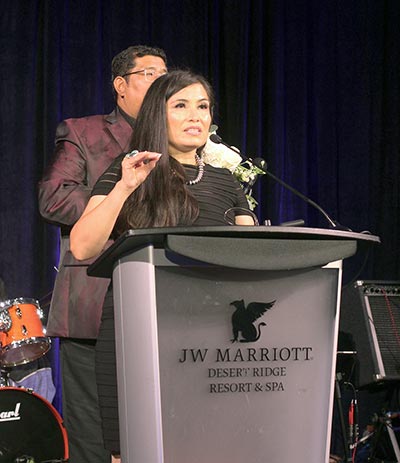
ALANA Foundation recognizes Navajo & Hopi Relief Fund

Courtesy photo | Sam Minkler
Dineh Benally presents the Navajo Community Hero Award to Relief Fund Executive Director Ethel Branch at the 2022 ALANA Foundation Gala.
Editor’s note: Mihio Manus is the Navajo & Hopi Families COVID-19 Relief Fund public relations director.
By Mihio Manus
CH’ÍHOOTSOOÍ
The Navajo & Hopi Families COVID-19 Relief Fund was recognized on Oct. 15 for its work to bring relief to Navajo families.
Ethel Branch, co-founder and executive director of the Navajo & Hopi Families COVID-19 Relief Fund, accepted the Navajo Community Hero Award on behalf of the organization.
Corina Gomez, board treasurer for the ALANA Foundation, said the relief fund was chosen for its direction in mobilizing millions of dollars in funding and hundreds of volunteers to protect Navajo and Hopi communities during the COVID-19 pandemic.
The ALANA Foundation is a 501(c)(3) nonprofit organization that works to address inequalities in healthcare by improving access and quality of healthcare for at-risk members of the Phoenix metropolitan area, according to its website.
According to its website, the relief fund started as a GoFundMe campaign in March 2020 to raise money to purchase food for Navajo and Hopi families. The campaign raised $5,000 in one day. To date, the organization has raised over $18 million.
Award presentation

Courtesy photo | Mihio Manus
Ethel Branch thanked her team of fierce Diné asdzáán and Hopi women leaders, hard-working front line warriors, partners, and donors that made it possible for the Relief Fund to protect Navajo and Hopi communities during the COVID-19 pandemic.
The award was presented during the ALANA Foundation’s annual gala and fundraiser at the JW Marriott Desert Ridge in Phoenix.
In her acceptance speech, Branch said that her experience working in environmental justice helped guide her journey to create the relief fund.
The co-founder of the relief fund said when the pandemic reached the reservation, she thought of families lacking electricity and no running water.
“When the pandemic hit, the healthcare conditions of our community were at the forefront of my mind,” Branch said. “When I read the list of immunocompromised conditions, it was like I was reading the health profile of my community: diabetes, high blood pressure, cancer, and upper respiratory conditions.”
Branch said a third of the Navajo tribe do not have electricity despite transmission lines carrying electricity south to cities like Phoenix, run by their homes.
“One-third of my people still don’t have electricity,” she said. “Many of our families had transmission lines running electricity south, by their homes, while they didn’t enjoy that basic 21st-century living condition.”
Additionally, she added that a third of the Navajo and Hopi people in the two nations lack running water.
CDC guidelines, forming relief fund

Courtesy photo | Mihio Manus
In her acceptance speech, Ethel Branch said that the work her team provides is done out of deep love and compassion for the Navajo people.
The Centers for Disease Control and Prevention recommended several safety guidelines to protect the public from SARS-CoV-2, a highly contagious respiratory disease, which included frequently washing hands for 20 seconds. At the time, there was no vaccination.
Frequent handwashing became an essential preventative measure to fight the spread of the novel coronavirus. But inaccessibility to water for families who hauled water became a matter of life or death.
Conditions like these prompted Branch to act quickly as the pandemic spread across the U.S. and the Navajo Nation in early 2020. At that time, the former Navajo Nation attorney general, with the help of a group of like-minded individuals, formed the Navajo & Hopi Families COVID-19 Relief Fund.
To date, the relief fund has helped nearly half a million Navajo and Hopi elderly, immunocompromised, and economically vulnerable tribal members living in the Navajo and Hopi nations (this calculation counts each service event anew; some people were served multiple times).
More than 361,000 people received food, water, and personal protection equipment, or PPE, through the organization’s direct relief programs. Over 146,000 adults and children received PPE through its distribution program.
In the first phase of the Covid response, between March 15, 2020, and March 26, 2021, the relief fund provided an average of $100,000 to $200,000 worth of direct relief to Navajo and Hopi communities weekly.
“In the first phase of our work, it was critical that we provided food in addition to PPE to our people because of the breakdown in national supply chain systems, tribal government-imposed lockdowns, and extreme food desert conditions on the Navajo and Hopi nations where we have only thirteen grocery stores in a jurisdiction the size of West Virginia,” Branch said. “Our next phase of operations was more focused on the sick and exposed.”
Isolation kits
In 2021 and 2022, during the Delta and Omicron surges of COVID-19, relief fund teams provided on-demand and home-delivered isolation kits to sick and exposed individuals. The kits included oximeters, thermometers, items to alleviate Covid symptoms, and food, water, and PPE.
Overall, the relief fund distributed over 10 million masks to the Navajo and Hopi people.
To staff these programs, the organization mobilized hundreds of primarily Navajo and Hopi volunteers who established 30 distribution teams and two seamstress squads across the Navajo and Hopi nations.
Branch refers to these local defenders and heroes as “frontline warriors.”
“Without them and their valiant efforts, there would have been no relief fund pandemic response,” Branch said. “I hate to think about what would have happened to our communities without them holding the line on life during this difficult time.”
The Navajo & Hopi Families COVID-19 Relief Fund also provided wood and coal heating resources to more than 4,420 elders in over 80 communities in the Navajo and Hopi nations. They provided PPE to medical staff, first responders, and high-contact individuals living and working in the two tribal nations.
They also distributed handwashing stations to over 1,100 Navajo and Hopi households that lacked indoor plumbing. When a vaccine was created, the organization conducted a pro-vaccine campaign that reached an estimated 857,000 Navajo and Hopi tribal members (counting each likely contact once; some people were called multiple times).
‘Compassion’ for people
Dineh Benally, the former president of the San Juan River Farm Board, presented Branch with the award. Benally was the keynote speaker at the gala.
“She (Branch) could have been selfish and just worried about her family, but she worried about her people, the Navajo people. She worried about the Hopi Nation as well,” Benally said. “Thank you, Ethel, for your time and your big heart.”
Benally and Branch recognized the efforts of the relief fund team members in attendance, including Arizona state Sen. Theresa Hatathlie; logistics coordinator Vanessa Tullie; board treasurer/direct relief program manager Mary Francis; and Mihio Manus, public relations director.
“We do our work out of deep love and compassion for our people, not for the accolades. But it’s nice to get recognized for the incredible effectiveness of our team,” Branch said. “Thank you to the tireless and fierce Diné asdzáán and Hopi women leaders and the incredibly brave and unbelievably hard-working frontline warriors, phenomenal partners, and amazing worldwide donors who made it possible for us to protect our communities during one of the darkest moments in our history.”
The Arizona House and Senate recognized the relief fund and presented the organization with the Community Service and Leadership Award. Branch was also recognized by Bill Gates as one of the “seven unsung heroes of the pandemic,” according to the relief fund’s website, and was awarded the 2020 Giraffe Hero Commendation.
Branch was also named Woman of the Year by the Phoenix Indian Center.
As a public service, the Navajo Times is making all coverage of the coronavirus pandemic fully available on its website. Please support the Times by subscribing.
How to protect yourself and others.
Why masks work. Which masks are best.
Resources for coronavirus assistance







 Highway 264,
Highway 264, I-40, WB @ Winslow
I-40, WB @ Winslow